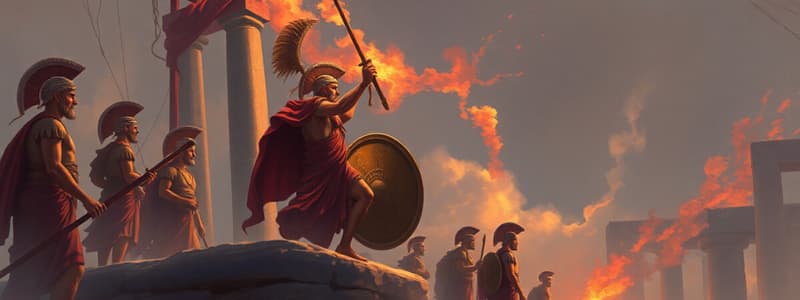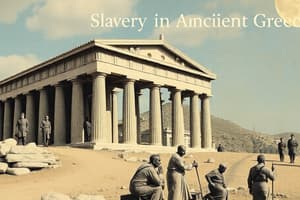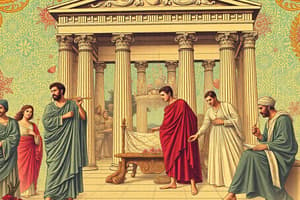Podcast
Questions and Answers
What was the main reason Cleisthenes initiated reforms in 508 BC?
What was the main reason Cleisthenes initiated reforms in 508 BC?
- To prevent tyranny from continuing (correct)
- To strengthen military alliances
- To diminish the influence of the common people
- To increase the power of aristocratic families
Which event marked the increase in violence within the tyranny before Cleisthenes' reforms?
Which event marked the increase in violence within the tyranny before Cleisthenes' reforms?
- The establishment of democratic practices
- The successful overthrow of Pisistratus
- The death of Hipparchos (correct)
- The rise of the common people
What structural change did Cleisthenes implement regarding tribes?
What structural change did Cleisthenes implement regarding tribes?
- He increased tribes from 3 to 15
- He eliminated all tribes and centralized power
- He established 4 to 10 tribes that elected a strategos (correct)
- He reverted back to a monarchy with no tribes
What role did the sons of Pisistratus play in the political landscape prior to Cleisthenes' reforms?
What role did the sons of Pisistratus play in the political landscape prior to Cleisthenes' reforms?
What was the general sentiment towards the tyranny leading up to Cleisthenes' reforms?
What was the general sentiment towards the tyranny leading up to Cleisthenes' reforms?
What were the two main types of slavery mentioned?
What were the two main types of slavery mentioned?
What was a significant difference in living conditions for enslaved people?
What was a significant difference in living conditions for enslaved people?
Which factor did NOT contribute to the military importance of hoplites?
Which factor did NOT contribute to the military importance of hoplites?
Who was Pisistratus and what was his impact on Athens?
Who was Pisistratus and what was his impact on Athens?
What was a defining characteristic of the phalanx formation?
What was a defining characteristic of the phalanx formation?
Which group had no political rights in Athens?
Which group had no political rights in Athens?
What does the term 'tyranny' refer to in the context of Athens?
What does the term 'tyranny' refer to in the context of Athens?
Who attempted an early coup in Athens to seize control?
Who attempted an early coup in Athens to seize control?
What was a major consequence of the Peloponnesian War?
What was a major consequence of the Peloponnesian War?
Who were the Spartan leaders mentioned in relation to the political changes after the war?
Who were the Spartan leaders mentioned in relation to the political changes after the war?
What did Sparta do in 382 BC?
What did Sparta do in 382 BC?
What was a key characteristic of the Second Athenian League established in 379 BC?
What was a key characteristic of the Second Athenian League established in 379 BC?
What was one economic crisis experienced after the war?
What was one economic crisis experienced after the war?
What did the democratic exiles seek to accomplish?
What did the democratic exiles seek to accomplish?
What contributed to the bloodshed following the Peloponnesian War?
What contributed to the bloodshed following the Peloponnesian War?
What is noted about the political structure of the Second Athenian League?
What is noted about the political structure of the Second Athenian League?
What significant battle did Alexander face against Darius III in 331 BC?
What significant battle did Alexander face against Darius III in 331 BC?
During which period did the Hellenistic culture primarily flourish?
During which period did the Hellenistic culture primarily flourish?
What does the term 'Cosmopolis' refer to in the given context?
What does the term 'Cosmopolis' refer to in the given context?
What was a notable weakness of the Etruscans?
What was a notable weakness of the Etruscans?
What can students infer about the Etruscan burial practices based on archaeological findings?
What can students infer about the Etruscan burial practices based on archaeological findings?
What was a result of the re-organization of Alexander's empire after his death?
What was a result of the re-organization of Alexander's empire after his death?
What is the meaning of 'religious syncretism' in the context provided?
What is the meaning of 'religious syncretism' in the context provided?
What is a defining feature of the Villanovan culture related to the Etruscans?
What is a defining feature of the Villanovan culture related to the Etruscans?
What was the role of Lysander in the context of the political changes mentioned?
What was the role of Lysander in the context of the political changes mentioned?
What significant event took place in 379 BC?
What significant event took place in 379 BC?
Which military formation was used by Thebes leading to their victory?
Which military formation was used by Thebes leading to their victory?
How many jurors (dikasts) typically participated in normal cases in the Athenian Justice System?
How many jurors (dikasts) typically participated in normal cases in the Athenian Justice System?
What type of government was established after the Decarchies?
What type of government was established after the Decarchies?
What was a key characteristic of the dikasteria in the Athenian Justice System?
What was a key characteristic of the dikasteria in the Athenian Justice System?
What was the outcome of the Battle of Leuctra in 371 BC?
What was the outcome of the Battle of Leuctra in 371 BC?
How were cases brought to the tribunal in the Athenian Justice System?
How were cases brought to the tribunal in the Athenian Justice System?
What did the Thirty Tyrants symbolize in Athenian history?
What did the Thirty Tyrants symbolize in Athenian history?
Which of the following statements is true regarding the Athenian dikasteria?
Which of the following statements is true regarding the Athenian dikasteria?
Flashcards are hidden until you start studying
Study Notes
Slavery in Ancient Greece
- Two types of slavery existed: communal and chattel slavery.
- Slaves had no rights and were considered property.
- Slaves were sold at slave markets.
- Living conditions varied based on the type of work.
- Slaves working in silver mines faced harsher environments compared to household slaves.
Hoplites
- Citizen-soldiers of Ancient Greece trained in heavy armor, carrying a shield (hoplon) and a spear.
- Employed the phalanx formation, a tightly packed defensive and offensive strategy reliant on teamwork.
- Represented core Greek values: excellence (arete), bravery, and loyalty to city-states.
- Crucial to Greek victories, particularly in the Persian Wars, due to their superior armor and tactics.
Tyranny in Athens
- Rule by a single individual who seized control, often not through heredity.
- Cylon's failed coup illustrates Athenian resistance to tyranny.
- Pisistratus, a tyrant, brought stability, promoted culture, and initiated important festivals and temple constructions, laying the groundwork for democracy.
Social Structure in Athens
- Citizens: Free male Athenians with political rights and land ownership; women's roles were limited to the home.
- Metics: Foreign residents without political rights but engaged in trade.
- Foreigners: Temporary visitors with no rights.
Cleisthenes (508 BC)
- Introduced Athenian democracy with reforms aimed at preventing power struggles between aristocratic families.
- Established 10 tribes, each electing a strategos.
- This system contributed to a more stable and democratic government.
The End of Tyranny in Athens
- The sons of Pisistratus gained control, but the tyranny became increasingly violent after Hipparchos was killed.
- Democratic exiles, aided by forces from Thebes (Thrasybulus), eventually ended the tyranny.
- Sparta, under Lysander, became the guarantor of peace and the architect of the new political order.
Spartan Hegemony
- Sparta established dominance following the Peloponnesian War.
- 382 BC: Sparta destroyed the Boeotian League and installed a pro-Spartan oligarchy in Thebes.
- 379 BC: The Athenian League was re-established with Athens as the leader, but members remained free and independent.
Lysander
- Spartan commander who played a key role in reshaping Athens after the Peloponnesian War.
- Reorganized Athenian governance.
- Established a system where there were no tributes levied on member states.
The Thirty Tyrants
- A pro-Spartan oligarchy that ruled Athens after the Peloponnesian War.
- The Thirty were made up of 10 Spartan officials and 700 Spartan soldiers.
- This regime's goal was to guarantee the stability of newly formed oligarchic regimes.
The Athenian Justice System and Socrates’ Trial
- Dikasteria: People's courts that played a significant role in the Athenian legal system.
- Dikasts: Jurors who decide cases.
- Trials were a single-day affair, with no appeals and precedence not being significant in judgment.
- Citizens were responsible for bringing their own cases to court, with no police or formal investigations.
The Battle of Leuctra (371 BC)
- A decisive victory for Thebes over Sparta, marking the end of Spartan supremacy.
- Led by Epaminondas and Pelopidas, the Thebans employed the oblique phalanx, a new tactical formation that proved successful against the Spartans.
The Rise of Thebes
- Thebes rose to become a dominant power in Greece after the Battle of Leuctra.
- Led by Epaminondas, Thebes conquered several cities and territories, including Messenia.
Alexander the Great (333 BC)
- Conquered the Persian Empire, marking the end of the Persian Wars.
- Battle of Gaugamela (331 BC): Final battle against Darius III in Northern Iraq, where Alexander secured his victory.
- Destruction of Persepolis: Symbolic act signaling the end of the Persian Empire.
The Hellenistic Period (321 - 30 BC)
- A period of significant cultural and linguistic convergence.
- Characterized by a shared language and culture, predominantly influenced by Greek traditions.
- A "melting pot" of cultures, with a significant degree of religious syncretism.
The Etruscans
- An indigenous people or immigrants who settled in Etruria (territory between the Arno and Tiber rivers).
- Never a united kingdom, but rather comprised independent city-states, a weakness that allowed Rome to rise.
- Left an archaeological record, including evidence of their unique burial practices (cremation and cinerary urns).
The Etruscan Language
- While Etruria shared a culture, it possessed a distinct language.
- Remains of Etruscan writing allow for ongoing study and understanding of their culture and history.
Studying That Suits You
Use AI to generate personalized quizzes and flashcards to suit your learning preferences.




